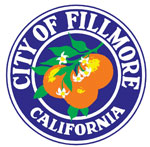|
Losing a Beloved Son of Our City
 Bill Morris, a member of the Fillmore Fire Foundation, read a statement regarding the foundation which Landeros started at council meeting, Tuesday night. By Jean McLeod — Wednesday, January 13th, 2016
Tuesday, January 12, 2016 Fillmore City Council Meeting
 City of Fillmore The Tuesday, January 12, 2016 Fillmore City Council Meeting began with recognizing the loss of Fire Chief and Assistant City Manager Rigo Landeros who passed away January 7, 2016. Each council member spoke of the impact and importance Landeros had on Fillmore, with Mayor Diane McCall reading a heartfelt written statement as she fought back tears. Bill Morris, a member of the Fillmore Fire Foundation, wrote a statement read by Scott Beylik, regarding the foundation which Landeros started: "Madam Mayor and Members of the Council The Foundation was the creation of Chief Landeros and the board members to bring additional pride and resources to one of the greatest Volunteer Fire Departments in Southern California. Our mission is simply to support the Fire Department, its members, as well as the City and our fellow citizens. We accomplished this mission by helping the City defray the cost of providing an expensive yet necessary public service. We feel we have been very successful in meeting this goal. We understand that at last week's goal setting session, the foundation's fundraising expenditures and accounting practices came into question, as well as Chief Landeros' participation in decision making. We want to assure the Council and the public that the foundation is following all accounting practices set forward by Federal and State standards. Furthermore, Chief Landeros was not a voting member nor signed any checks to cover expenditures the board agreed and voted to fund. All of our charitable revenue was generated through fundraising, grant writing and charitable donations. We will be happy to sit down and open our records with anyone who wishes, in order to avoid any further accusation of impropriety of the Board actions or our former comrade, Rigo Landeros, who served our City for all of his adult life and unfortunately lost his life in service to our community and its citizens. Thank you for the opportunity to clarify this issue." Respectively, The first agenda item was a simple vote amending a zoning ordinance to allow artificial turf in front yards and received unanimous approval. The second item was a public hearing and adoption of Urgency Ordinance No. 16-856 prohibiting marijuana dispensaries in Fillmore. The Council is trying to stay one step ahead of State regulations that were signed recently. Back in January 2004 Legislature SB 420 was signed that established a medical marijuana ID card system and created guidelines allowing patients up to 6 mature or 12 immature plants and up to one-half pound of dried processed marijuana for personal use allowing seriously ill patients and their caregivers to cultivate medical marijuana cooperatively and collectively with others who use or produce it for medical purposes. On October 9, 2015 Governor Brown signed three bills into law that regulate medical marijuana cultivation, sales and distribution in California. AB 243, AB 266 and SB 643 known as the Medical Marijuana Regulation and Safety Act, are intended to create a comprehensive scheme for regulating all aspects of commercial medical marijuana activity. There may have been pressure in Sacramento to pass a workable regulation before a full legalization measure is put before the voters in 2016. AB 266 allows cities and counties to ban medical marijuana businesses within their borders. AB 243, which has a deadline, states that a city, county, or city and county does not have land use regulations or ordinances regulating or prohibiting the cultivation of marijuana, either expressly or otherwise under principles of permissive zoning; or chooses not to administer a conditional permit program pursuant then, commencing March 1, 2016, the State shall be the sole licensing authority for medical marijuana cultivation applicants in that city, county, or city and county. There was some discussion by the Council that the March deadline may have been eliminated. SB 643 pertains to regulating the medical doctors who write prescriptions for medial marijuana. Fillmore's ordinance is focused on marijuana dispensaries and does not apply to qualifying patients engaged in personal cultivation within the legal limits if the cultivation is not for sale, distribute, donate, or provide marijuana to any other person or entity. It also does not apply to designated primary caregivers growing for qualifying patients. The illnesses covering the medical use are numerous: Cancer, Epilepsy, AIDS/HIV, Huntington's Disease, Inflammatory Bowel Disease, Lou Gehrig's Disease, Parkinson's Disease, Multiple Sclerosis, Neuropathies, Spinal Cord Damage, Anorexia, Chronic Pain, Spasticity, Glaucoma, Arthritis, Migraine. It is legal to purchase marijuana for recreational use in Alaska, Colorado, Oregon, Washington and in the District of Columbia. A number of states have decriminalized marijuana, but not legalized it. Those states often issue a violation, similar to a driving ticket with penalties for small amounts. |
